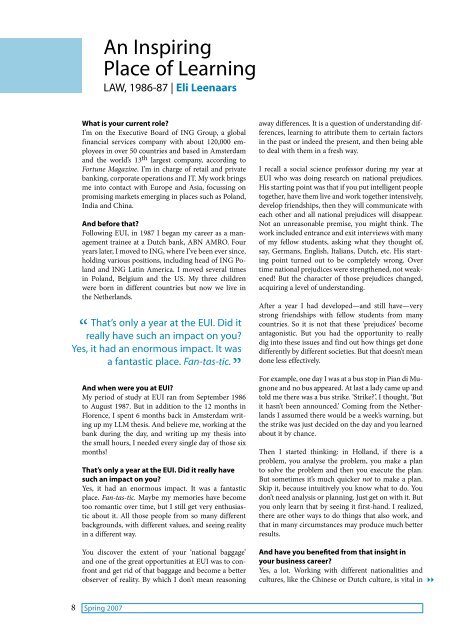Spring 2007 - European University Institute
Spring 2007 - European University Institute
Spring 2007 - European University Institute
Create successful ePaper yourself
Turn your PDF publications into a flip-book with our unique Google optimized e-Paper software.
What is your current role?<br />
I’m on the Executive Board of ING Group, a global<br />
financial services company with about 1 0,000 employees<br />
in over 50 countries and based in Amsterdam<br />
and the world’s 1 th largest company, according to<br />
Fortune Magazine. I’m in charge of retail and private<br />
banking, corporate operations and IT. My work brings<br />
me into contact with Europe and Asia, focussing on<br />
promising markets emerging in places such as Poland,<br />
India and China.<br />
And before that?<br />
Following EUI, in 1987 I began my career as a management<br />
trainee at a Dutch bank, ABN AMRO. Four<br />
years later, I moved to ING, where I’ve been ever since,<br />
holding various positions, including head of ING Poland<br />
and ING Latin America. I moved several times<br />
in Poland, Belgium and the US. My three children<br />
were born in different countries but now we live in<br />
the Netherlands.<br />
And when were you at EUI?<br />
My period of study at EUI ran from September 198<br />
to August 1987. But in addition to the 1 months in<br />
Florence, I spent months back in Amsterdam writing<br />
up my LLM thesis. And believe me, working at the<br />
bank during the day, and writing up my thesis into<br />
the small hours, I needed every single day of those six<br />
months!<br />
That’s only a year at the EUI. Did it really have<br />
such an impact on you?<br />
Yes, it had an enormous impact. It was a fantastic<br />
place. Fan-tas-tic. Maybe my memories have become<br />
too romantic over time, but I still get very enthusiastic<br />
about it. All those people from so many different<br />
backgrounds, with different values, and seeing reality<br />
in a different way.<br />
You discover the extent of your ‘national baggage’<br />
and one of the great opportunities at EUI was to confront<br />
and get rid of that baggage and become a better<br />
observer of reality. By which I don’t mean reasoning<br />
8 <strong>Spring</strong> <strong>2007</strong><br />
An Inspiring<br />
Place of Learning<br />
LAW, 1986-87 | Eli Leenaars<br />
“ That’s only a year at the EUI. Did it<br />
really have such an impact on you?<br />
Yes, it had an enormous impact. It was<br />
a fantastic place. Fan-tas-tic. ”<br />
away differences. It is a question of understanding differences,<br />
learning to attribute them to certain factors<br />
in the past or indeed the present, and then being able<br />
to deal with them in a fresh way.<br />
I recall a social science professor during my year at<br />
EUI who was doing research on national prejudices.<br />
His starting point was that if you put intelligent people<br />
together, have them live and work together intensively,<br />
develop friendships, then they will communicate with<br />
each other and all national prejudices will disappear.<br />
Not an unreasonable premise, you might think. The<br />
work included entrance and exit interviews with many<br />
of my fellow students, asking what they thought of,<br />
say, Germans, English, Italians, Dutch, etc. His starting<br />
point turned out to be completely wrong. Over<br />
time national prejudices were strengthened, not weakened!<br />
But the character of those prejudices changed,<br />
acquiring a level of understanding.<br />
After a year I had developed—and still have—very<br />
strong friendships with fellow students from many<br />
countries. So it is not that these ‘prejudices’ become<br />
antagonistic. But you had the opportunity to really<br />
dig into these issues and find out how things get done<br />
differently by different societies. But that doesn’t mean<br />
done less effectively.<br />
For example, one day I was at a bus stop in Pian di Mugnone<br />
and no bus appeared. At last a lady came up and<br />
told me there was a bus strike. ‘Strike?’, I thought, ‘But<br />
it hasn’t been announced.’ Coming from the Netherlands<br />
I assumed there would be a week’s warning, but<br />
the strike was just decided on the day and you learned<br />
about it by chance.<br />
Then I started thinking: in Holland, if there is a<br />
problem, you analyse the problem, you make a plan<br />
to solve the problem and then you execute the plan.<br />
But sometimes it’s much quicker not to make a plan.<br />
Skip it, because intuitively you know what to do. You<br />
don’t need analysis or planning. Just get on with it. But<br />
you only learn that by seeing it first-hand. I realized,<br />
there are other ways to do things that also work, and<br />
that in many circumstances may produce much better<br />
results.<br />
And have you benefited from that insight in<br />
your business career?<br />
Yes, a lot. Working with different nationalities and<br />
cultures, like the Chinese or Dutch culture, is vital in<br />
}}

















